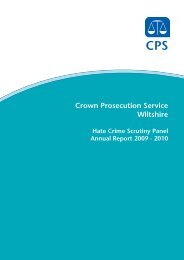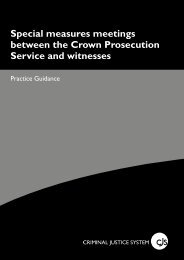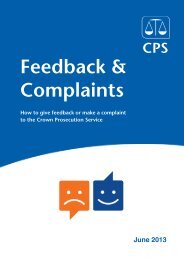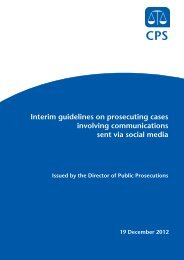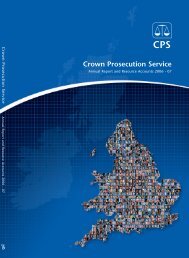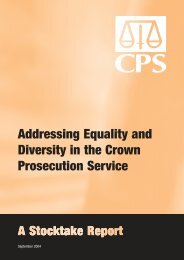CPS Derbyshire - Crown Prosecution Service
CPS Derbyshire - Crown Prosecution Service
CPS Derbyshire - Crown Prosecution Service
Create successful ePaper yourself
Turn your PDF publications into a flip-book with our unique Google optimized e-Paper software.
<strong>CPS</strong> <strong>Derbyshire</strong>Introduction by the Chief <strong>Crown</strong> ProsecutorIam pleased to report to you aboutthe work we’ve undertaken in<strong>Derbyshire</strong> in the year toMarch 2004.During the year we dealt with 23,032cases in the magistrates’ courts and afurther 2,631 cases in the <strong>Crown</strong> Court.Our conviction rate for the year standsat 95% in the <strong>Crown</strong> Court and 97% inthe magistrates’ courts. To handle thisnumber of cases we employed a totalof 106 staff and operated within ourbudget of some £5.6 million.From our offices in Derby we divideour work on functional lines betweenthe magistrates’ court work dealt withby the Criminal Justice Units and<strong>Crown</strong> Court work dealt with by ourTrials Unit. Anna Zimand is Head ofour Trials Unit; Karen Jackson is Headof our North Criminal Justice Unit,which prosecutes cases at Chesterfield,Buxton and Glossop magistrates’courts, and Sally French is acting Headof the South Criminal Justice Unit,which prosecutes cases at Derby andAnna Zimand, Karen Jacksonand Sally French.Ilkeston magistrates’ courts.This year, in conjunction with<strong>Derbyshire</strong> Police, we’ve implementeda shadow Charging Scheme to improveour casework performance. Thisshadow scheme is the forerunner to astatutory scheme. It aims to reduce thenumber of cases we discontinue due toinsufficient evidence, increase thenumber of guilty pleas and reduce thenumber of ineffective trials.A team of eight <strong>Crown</strong> Prosecutors, ledby Julian Gill, work on the scheme andare permanently based at the fourpolice charging centres (Derby,Alfreton, Chesterfield and Buxton). Theywork with police officers from an earlystage in the investigation, deciding onthe charges upon which cases shouldproceed.This critically important aspect of ourwork will provide a major contributionto the plans that the <strong>Derbyshire</strong>Criminal Justice Board (DCJB) hasdeveloped this year. The DCJBcomprises chief officers of the <strong>CPS</strong>, thepolice, magistrates’ courts, <strong>Crown</strong>Court, Probation <strong>Service</strong>, YouthOffending Teams and Prison <strong>Service</strong>and a number of their deputies. Thisyear I have chaired the DCJB but nextyear it will be chaired by Dr SteveGoode, the Chief Probation Officer.The DCJB’s plans have two principalaims, namely to narrow the justice gap(that is the difference between thenumber of offences committed and thenumber for which offenders are broughtto justice) and raise confidence in thecriminal justice system. It gives us theopportunity to work across the wholeof the criminal justice system withcommon aims and objectives. Toimprove awareness and knowledge ofthe work the DCJB undertakes we’velaunched a website:www.cjsonline.org/lcjb/derbyshireThe Board is aware that otherpartners in the criminal justicesystem – and indeed everymember of the community – havea contribution to make to theoperation of the criminal justicesystem. To ensure that we are awareof and take account of thisAnnual Report 2003-2004 3
<strong>CPS</strong> <strong>Derbyshire</strong>About the <strong>Crown</strong> <strong>Prosecution</strong> <strong>Service</strong> – <strong>Derbyshire</strong>The year ending March 2004 hasbeen characterised by continuingchange and the introduction of anumber of major initiatives.Deciding the chargeUnder the Criminal Justice Act 2003responsibility for charging defendantswill transfer from the police to the <strong>CPS</strong>,except in minor and straightforwardcases.This means that the <strong>CPS</strong> can establish ifthere is sufficient evidence to support acharge – and if so, if it’s in the publicinterest to proceed – before the suspectis actually charged. The chargingscheme aims to remove weak casesfrom the system before charges aremade and enable both the police and<strong>CPS</strong> to focus resources on those casesthat have a realistic prospect ofconviction.In advance of this legislation cominginto force, <strong>CPS</strong> <strong>Derbyshire</strong> hasdeveloped a ‘shadow’ chargingscheme, with a view to implementing astatutory scheme following assessmenttowards the end of 2004.The shadow scheme was launched inChesterfield in November 2003 andwas rolled out to all other policedivisions – Alfreton, Buxton and Derby– the following month. Under thisscheme our team of eight <strong>Crown</strong>Prosecutors, based in police stations,are providing pre-charge advice to theinvestigating officers.Although it’s still early days, once thescheme is fully implemented we expectto see the following benefits:• fewer charges being dropped orchanged;• a rise in the number of defendantspleading guilty at the first hearing;• a reduction in the number ofdiscontinued cases;• a reduction in the number of crackedand ineffective trials, which are costlyand wasteful of everyone’s time,including that of victims andwitnesses. (A cracked trial occurswhen the defendant changes his orher plea to guilty on the day of thetrial and an ineffective trial is onewhere the case is adjourned untilanother date);• an increase in conviction rates;• improved communication and betterworking relationships with the police;and• increased public confidence in thecriminal justice system.Charging represents a fundamentalchange in the way the police and <strong>CPS</strong>work together and will result in a moreeffective and efficient service for thepeople of <strong>Derbyshire</strong>.Improved communicationIn April 2003 the <strong>CPS</strong> became the firstcriminal justice agency to implement anational electronic case managementsystem. <strong>CPS</strong> <strong>Derbyshire</strong> went live withthis new IT system – known asCompass – in May.Compass was introduced to helpCharging lawyers Neville Whittonand Karen Davenport-Colesproviding pre-charge advice atRipley police station.modernise and improve the way wemanage our casework. It enables us todeal with cases much more efficiently,without the reliance on paper-basedfiling systems.Irrespective of their location,prosecutors across all <strong>CPS</strong> Areas canuse the system to access defendants’full case histories, includinginformation on previous offences,associated crimes and outstandingwarrants. This information can be usedto help lawyers prepare a strongerprosecution, particularly in the case ofrepeat offenders.This technology will also enable us tospeed up the lines of communicationwith our partners across the criminaljustice system. Once all criminal justiceagencies come online with their casemanagement systems we will be able toreceive and exchange informationelectronically, resulting in moreeffective, joined-up working.Our staff have risen to the challengesthis new system has brought; <strong>CPS</strong><strong>Derbyshire</strong> has one of the highest stafftake-up rates in the country. Part of thissuccess is due to the ongoing supportAnnual Report 2003-20045
<strong>CPS</strong> <strong>Derbyshire</strong>Victims’ programme, which wasintroduced in <strong>Derbyshire</strong> in March2002, continues to go from strength tostrength. The programme aims to ensurethat victims of crime are kept up tospeed with any developments in theircase at the earliest opportunity.offered to staff throughout theimplementation process, includingtraining courses, workshops, telephonesupport, one-to-one training andregular updates.As we were the first Area in the EastMidlands to go live with Compass wesupported other Areas in the region asthey adopted the new system. This hasincluded giving presentations, sharingOur Victim andWitness meetingroom.useful documentation and offeringadvice and guidance. Our LocalImplementation Plan showing keymilestones, training events andupgrades has been used by RegionalAdvisors as an example of best practicefor other Areas as they go live with thesystem.Communicating with victimsOur ‘Direct Communication withUnder the programme our lawyers arecommitted to writing to victims toinform them of a decision to drop orsubstantially alter their case within fivedays of this decision being made. Allour prosecutors receive training onpreparing informative and sensitiveletters that explain fully why theparticular case has been discontinuedor changed. We introduced DirectCommunication with Victims Coordinatorsin each of our three Units;with responsibility for monitoring theprogramme and ensuring we meet ourfive-day target.In more serious and sensitive cases weinvite the victim, and in some casesMarkeaton Park.6 Annual Report 2003-2004
<strong>CPS</strong> <strong>Derbyshire</strong>their family, to attend an informalmeeting at <strong>CPS</strong> where we explainface to face why a decision has beenmade and try to answer anyquestions they may have.Looking ahead, later this year we planto establish a dedicated VictimInformation Bureau, to amalgamate thework currently carried out by individuallawyers and provide a more efficientand informative service to victims andwitnesses.Tackling persistentyoung offendersWe continue to work closely with ourpartners in the criminal justice systemto bring persistent young offenders(PYOs) to justice as quickly as possible.This speedy response aims to makePYOs more directly accountable fortheir crimes and to help prevent themre-offending.A young offender will be regarded as aPYO if he or she has been convicted ofa criminal offence on three separateoccasions, with the last of theseoccurring within three years of thecurrent offence for which they havebeen charged.Case Progression Meetings. Held inboth Chesterfield and Derby, thesemeetings provide opportunities toreview the progress of outstanding PYOcases and agree ways forward indealing with them.Ensuring crime doesn’t payAround 70% of all crime is committedfor financial gain. Following theintroduction of the Proceeds of CrimeAct (POCA) in March 2003, which gave<strong>Crown</strong> Courts the authority toconfiscate criminal assets fromconvicted offenders, <strong>CPS</strong> <strong>Derbyshire</strong>has taken further steps to ensure thatcriminals do not profit from theircrimes.In 2003 we introduced a Proceeds ofCrime Champion who has been trainedin obtaining restraint, confiscation andreceivership orders. A restraint orderhas the effect of freezing property thatmay subsequently be the subject of aconfiscation order. The total value ofassets recovered during the year by<strong>CPS</strong> <strong>Derbyshire</strong> was £278,006.98 fromconfiscation orders and £3,187,183.44from restraint orders.Helping tackledomestic violenceIn May 2003 Derby became one ofonly five areas in England and Wales tohave a Specialist Domestic ViolenceCourt (SDVC). Based at the magistrates’court in St Mary’s Gate, Derby’s SDVChas been created with the specific needsof domestic violence victims in mind.Domestic violence accounts for aquarter of all violent crime. Researchshows that by the time a victim makesa formal complaint there have usuallyThe Government target for bringingPYOs to justice stands at 71 days; this ismeasured as the time from arrest tosentencing. The average arrest tosentence time for PYO cases processedby criminal justice agencies in<strong>Derbyshire</strong> in 2003 (January toDecember) was 60 days. This is anexcellent performance and reflects theefforts that have been made by allagencies involved to address the issue.To ensure we maintain the momentumin dealing with PYOs we’ve joinedcolleagues from the magistrates’ court,the Youth Offending <strong>Service</strong> and thepolice in participating in monthly PYOStealing a tank of petrol cost Wayne Broadhead £1.5 million after aconfiscation order against him was made under the Criminal Justice Act 1988.Broadhead was arrested on the fourth occasion he left a filling station withoutpaying for the fuel. Those four crimes involved petrol valued at £219 – butsparked a complex financial investigation that eventually cost him £1,566,911.The <strong>Derbyshire</strong> Financial Investigation Unit (FIU) undertook a more detailedenquiry into Broadhead’s finances, which eventually uncovered a series ofoffences including car theft and a number of instances of making off withoutpayment. They discovered millions of pounds had gone through his bankaccounts, even though he had been claiming state benefits for the previoussix years. The POCA team at <strong>CPS</strong> worked closely with officers from the FIUto obtain this substantial order that enabled his proceeds of crime to berecovered.Annual Report 2003-20047
<strong>CPS</strong> <strong>Derbyshire</strong>Working in partnershipAlthough <strong>CPS</strong> is an independentbody, we don’t work in isolation.We’ve always worked closely withour partners in the criminal justicesystem, and in April 2003 thistook on a more formal footingwith the formation of the<strong>Derbyshire</strong> Criminal JusticeBoard (DCJB).The DCJB is made up of ChiefOfficers from the police, <strong>CPS</strong>,Prison <strong>Service</strong>, magistrates’ court,<strong>Crown</strong> Court, Probation <strong>Service</strong>and Youth Offending <strong>Service</strong>. In2003/04 our Chief <strong>Crown</strong>Prosecutor was Chair of theBoard, and our three Unit Headscurrently sit on the CourtEfficiency Sub Group.Members of the Local CriminalJustice Board 2003-04.been, on average, some 34 previousincidents. Invariably, over time the levelof violence, and its frequency, increasesand can have fatal consequences. InEngland and Wales twowomen are killed by theircurrent or former partnersevery week. <strong>CPS</strong> <strong>Derbyshire</strong>is committed to tackling thisproblem and we continue towork closely with ourcolleagues in the criminaljustice system to offer bettersupport to victims ofdomestic abuse. Along withthe Domestic ViolencePartnership, we were thelead agency in establishingthe SDVC in Derby.Victims of domestic violenceare often reluctant to be witnesses incourt because of their relationship withthe defendant, particularly wherechildren are involved. Many feelAltport Heights.vulnerable and intimidated, and findthe prospect of going to court daunting.Derby’s dedicated domestic violencecourt aims to tackle this issue byensuring the justice system is morereceptive to the needs of victims.It’s a joint initiative between the police,the courts, the <strong>CPS</strong>, the DomesticViolence Partnership and voluntarysector groups such as women’s supportgroups. Its core principles includeaccess to lay advocates(someone who supportsthe victim by acting as a‘go-between’ between thecourts, police and <strong>CPS</strong>),co-ordination of partneragencies, providing avictim and child friendlycourt and providingspecialistpersonnel– including <strong>CPS</strong>prosecutors, legaladvisers and magistrates –who have been trained indomestic violenceawareness andprocedures.<strong>CPS</strong> in the communityBuilding links with the localcommunity and increasing the public’s8 Annual Report 2003-2004
<strong>CPS</strong> <strong>Derbyshire</strong>Two members of staff were awarded OBEs in the Queen’sNew Year’s Honours List in recognition of their servicesto the <strong>CPS</strong>.Chief <strong>Crown</strong> Prosecutor Brian Gunn, and Head of theTrials Unit, Anna Zimand (right), were presented with theirawards by Her Majesty The Queen at a special ceremonyat Buckingham Palace in June. Brian joined <strong>CPS</strong><strong>Derbyshire</strong> in April this year.Both were delighted to receive their awards, but werekeen to stress that the achievement was not all their own.Anna said: “This is a great personal honour, but it is also arecognition for my colleagues in Derby and all ourpartners in the criminal justice system, including thepolice, the probation service and the courts. After all,you’re only as good as the people you work with.”Brian too, was keen to acknowledge the support he’dreceived from colleagues. “I have always enjoyed working for the <strong>CPS</strong>, and I am delighted and amazed to receive thisaward” he said, speaking after the ceremony. “However there are many more colleagues in the service who equallydeserve recognition for their work. This award is not only a reflection of my work but also that of colleagues past andpresent across the service who have been of great help and assistance to me throughout my career.”confidence in the justice system is apriority for the <strong>CPS</strong>. Throughout theyear we’ve participated in a number ofinitiatives that aim to raise awareness ofthe work of <strong>CPS</strong> and our role in thecriminal justice system.• Derby has a large deaf community,many of whom use British SignLanguage (BSL) as their preferredmethod of communication. Wecontinued to sponsor a member ofstaff to study BSL, and in June shesuccessfully passed her Stage 2examination. During the year weprosecuted a case in which thecomplainant, the main prosecutionwitnesses and the defendant were alldeaf. Our trained member of staffattended the case and was able tocommunicate directly with thecomplainant and keep him and thewitnesses informed of progress anddevelopments throughout thecourt case.• In September a number of staffattended a conference at theUniversity of Derby organised by <strong>CPS</strong>and Voice UK. The conference –‘Across the Divide’– aimed to improvecommunication and understandingbetween the <strong>CPS</strong> and people withlearning difficulties.• For a third year <strong>CPS</strong> <strong>Derbyshire</strong> hasparticipated in the PATRA trainingscheme, which provides workexperience and training opportunitiesfor young black and minority ethnicpeople. The trainee spent one day aweek at college, and four daysproviding administration support inour Trials Unit. The scheme has so farbeen very successful, with one formertrainee now employed here at <strong>CPS</strong> ona permanent basis.• We took part in a local recruitmentfair in order to raise awareness of therole of <strong>CPS</strong> and the various careeropportunities available within the<strong>Service</strong>. We aim to attend at least oneof these events each year. Theyinvariably generate lots of enquiries;we hold all contact details providedon file for six months and keeppeople informed of any vacancies thatarise during that time.• Throughout the year we worked witha number of schools in the county;we took part in an Interview Eveningat Chellaston School where weprovided advice on interview skillsand techniques, and talked to parentsand pupils at Queen ElizabethGrammar School in Ashbourne aboutcareers within the <strong>CPS</strong>. Our workexperience placements are open toall schools in the county; over thepast year 14 pupils have spent aweek with the <strong>CPS</strong>, working with ouradministration staff in our offices andspending time at the courts jobshadowingour lawyers.Annual Report 2003-20049
<strong>CPS</strong> <strong>Derbyshire</strong>CaseworkOur core business is prosecutingcases. During 2003-04 weprosecuted 23,032 cases inthe magistrates’ court and 2,631 casesin the <strong>Crown</strong> Court. A number of thesecases attracted a high level of mediaattention; here we focus on just three ofthem:Father and son receivemaximum possible jail sentenceThe case of William and MitchellGreenwood was one of the mostunusual cases that <strong>CPS</strong> <strong>Derbyshire</strong> hashad to deal with.In January 2004, after a six-week trial,the father and son from SouthWingfield were found guilty ofconspiracy to convert deactivatedfirearms into live weapons. It is notillegal to possess, buy or selldeactivated weapons. However, fromtheir rifle shop in Little Eaton theGreenwoods supplied deactivatedfirearms together with various pieces ofequipment and instructions that wouldenable the weapons to be reactivated.Between January 1990 and February1999, deactivated firearms sold by theGreenwoods and subsequentlyreactivated were used in a total of 53crimes, including cases of armedrobbery and murder. One was used bya man who killed the mother of hisunborn child and his mother-in-law,before hanging himself in Prestwich inJuly 2000. Another was used by a fatherof two who shot a wealthy car dealerand his wife four times in the head inEast Sussex in February 1993. TheGreenwoods’ guns were also usedin armed robberies carried out atpost offices in Essex and in securityvan hold-ups in both Kent andManchester.In March this year the Greenwoodswere each sentenced to seven years’imprisonment, the maximum penaltygiven for this type of crime. Insentencing, Judge Alison Hampton toldthem: “You were an essential andimportant part of a supply chain andwithout your readiness to supply thosecustomers with criminal intentions,some of these crimes would not havebeen committed.”This was a very difficult case coveringan unusual area of the law, and wasnew territory for many of theprosecution team involved. Aspossession of deactivated firearms is initself not a criminal offence, thewording of the charge requiredconsiderable thought. The investigationwas long and complicated, taking placeover several years, and we collaboratedclosely with the police in order to bringthe case to trial.Speaking after the sentencing, TrialsUnit Head Anna Zimand said: “Wehope this verdict sends out the clearmessage that the <strong>CPS</strong> takes firearmsoffences very seriously and willcontinue to vigorously prosecutepeople involved in this type of activity.”Operation OrangeWhat made this case of credittransaction fraud particularly novel wasthat it involved six defendants, Britishand Greek police, witnesses fromIreland, Greece and Bulgaria and bankaccounts held in the UK, Bulgaria,Spain, the USA and Greece.On 15 March 2002, the defendants,operating from both England andCyprus, fraudulently credited almost£2.5 million to a number of differentbank accounts. They did this by issuingrefunds for non-existent debit cardtransactions using Electronic Point ofSale equipment – the machines used byretailers to process debit and creditcard transactions. They then intended tolaunder the money in England, mainlythrough the purchase of expensive cars.Two of the defendants owned a shop inPleasley Mills, <strong>Derbyshire</strong>, where theysuccessfully issued a total of 56 refundsto 12 debit card accounts via the cardmachine. A further 94 fraudulenttransactions totalling approximatelyDerby Evening Telegraph10 Annual Report 2003-2004
<strong>CPS</strong> <strong>Derbyshire</strong><strong>Derbyshire</strong> Times, June 2003.£1.5 million were made from Cyprus to12 separate cardholders.For the six-week trial, which was heldat Derby <strong>Crown</strong> Court, we had to fly inwitnesses from Bulgaria, Ireland andGreece, as well as provide interpretersfor the Bulgarian and Cypriot witnesses.Although only one of the defendantspleaded guilty, all six were found guiltyof conspiracy to defraud and receivedbetween six months and four-and-a-halfyears’ imprisonment.Son found guilty ofmurdering his fatherIn February 2004, <strong>CPS</strong> <strong>Derbyshire</strong>successfully prosecuted 32-year-oldJohn Madin for the murder of his fatherBrian Madin.John Madin was a drug addict and therelationship between the father and sonwas strained; Brian Madin wasincreasingly unwilling to indulge hisson’s requests for funds or to allow himto stay in the family house in NewWhittington, Chesterfield.Tensions came to a head on theafternoon of 3 June 2003 when,following a disagreement, John Madinbludgeoned his father to death in thefamily home. He then hid the bodyunder the bed in the master bedroom,where it remained for five days.John Madin explained his father’sdisappearance by saying he’d gone tostay with relatives. During the five daysthe body lay under the bed herepeatedly used his father’s debit cardto obtain cash to buy drugs.In the early hours of 8 June, JohnMadin removed the body to a countryroad less than two miles away from themurder site, dumped it in a hedgerowand covered it with grass cuttings.Throughout the two-week trial thedefendant maintained that the death ofhis father had been “an accident”; aclaim the prosecution was able toconclusively disprove. John Madinasserted that his father had struck hishead on a doorstep after he pushedhim during the argument. He claimedthat the multiple head wounds weresustained when he repeatedly droppedhis father, causing him to strike hishead on the step several more times ashe attempted to pick him up.John Madin was found guilty of themurder of his father Brian Madin andsentenced to life imprisonment, with arecommendation that he serve aminimum term of 14 years.Annual Report 2003-200411
<strong>CPS</strong> <strong>Derbyshire</strong>Performance in the Magistrates’ CourtsChart 1 Caseload (receipts and finalisations)25,00020,00015,000Received21,136Finalised21,08021,81021,741All prosecutions start in the magistrates’ courts,which involve offences such as minor motoringmatters ranging to assault and theft. The moreserious cases will be heard in the <strong>Crown</strong> Courtonce they have been through the magistrates’court process.10,0005,0000April 1 2002 - March 31 2003 April 1 2003 - March 31 2004Chart 2 Case CategoriesChart 1 shows the number of defendantsreceived and finalised in the Area for the periodApril 2003 – March 2004 against the numberfor the period April 2002 – March 2003.Chart 2 illustrates the type of cases finalised inApril 2003 – March 2004 compared with thesame period in 2002 – 2003:Summary Indictable/Either Way AdviceSummary Only – Cases which can only be triedin the magistrates’ courts.12,0009,0006,00048.2%10,15546.8%9,87542.8%9,81540.4%9,26416.9%3,873Indictable/Either Way – Indictable only offences(the most serious cases such as murder, rape androbbery) must be tried in the <strong>Crown</strong> Court, buteither way offences (such as theft) may be triedin either the magistrates’ court or in the <strong>Crown</strong>Court.3,0005%1,0500April 1 2002 - March 31 2003 April 1 2003 - March 31 2004Total 21,080 Total 22,952Chart 3 Case ResultsGuilty Pleas Proofs in Absence After Trial Dismissals15,00075.3% 77.2%11,745 11,354Cases for Advice – Cases in which the police askfor our advice about whether proceedings shouldbe started.Other Proceedings – Non-criminal matters, suchas forfeiture under the Obscene PublicationsActs.Chart 3 shows a breakdown of the number ofdefendants proceeding to a hearing, whichresulted in a conviction.10,0005,000016.4%13.5%2,5526.2% 1,997 6.2%967 2.1% 3.1%910335 449April 1 2002 - March 31 2003 April 1 2003 - March 31 2004Total 15,599 Total 14,81112 Annual Report 2003-2004
<strong>CPS</strong> <strong>Derbyshire</strong>Performance in the <strong>Crown</strong> CourtChart 4 Caseload (receipts and finalisations)3,0002,2501,500750Received2,559Finalised2,7762,611 2,631A number of cases can only be tried in the<strong>Crown</strong> Court. Other cases are heard at the<strong>Crown</strong> Court either because the defendantchooses to be tried there, by electing to go to<strong>Crown</strong> Court; or when the magistrates declinejurisdiction due to the offences being so seriousthat they need to be heard as a <strong>Crown</strong> Court trialor are committed for sentence. Should thedefendant plead not guilty, the case proceeds asa trial before a judge and jury.0April 1 2002 - March 31 2003 April 1 2003 - March 31 2004Chart 5 Case CategoriesCommitted for Trial Appeals Commmitted for Sentence2,000 64%1,67061.5%1,5001,4571,00026%28.2%680 66950010% 10.3%261 2450April 1 2002 - March 31 2003 April 1 2003 - March 31 2004Total 2,611 Total 2,371Chart 6 Case ResultsChart 4 shows the comparison of receipts andfinalisations for the period April 2003–March2004 against the same period in 2002–2003.Chart 5 shows case categories finalised in April2003 – March 2004 compared with the sameperiod in 2002 – 2003:Committal for trial – Indictable only and someEither Way cases are sent from the magistrates’court.Appeals – Defendants may appeal to the <strong>Crown</strong>Court against the conviction and/or sentence thatthey received in the magistrates’ court.Committed for sentence – Defendants that aretried and convicted in the magistrates’ court.However, the magistrates decide that thepunishment required is greater than theirsentencing powers allow, therefore the case issentenced before a judge in the <strong>Crown</strong> Court.Guilty Pleas Conviction After Trial Acquittals1,5001,20073.3%1,14288.7%1,292900600300016.4%10.3% 2567.3% 4%160106 59April 1 2002 - March 31 2003 April 1 2003 - March 31 2004Total 1,558 Total 1,457Annual Report 2003-200413
<strong>CPS</strong> <strong>Derbyshire</strong>About the <strong>Crown</strong> <strong>Prosecution</strong> <strong>Service</strong>The <strong>Crown</strong> <strong>Prosecution</strong> <strong>Service</strong> isheaded by the Director ofPublic <strong>Prosecution</strong>s, KenMacdonald QC. The Director issuperintended by the AttorneyGeneral who is accountable toParliament for the <strong>Service</strong>. The ChiefExecutive is Richard Foster, who isresponsible for human resources,finance, business information systems,criminal justice policy and businessdevelopment, allowing the Director toconcentrate on prosecution and legalissues.The <strong>CPS</strong> has 42 Areas across Englandand Wales, matching police forceboundaries (<strong>CPS</strong> London covers theMetropolitan and City of Londonforces). Each Area is headed by a Chief<strong>Crown</strong> Prosecutor who is responsiblefor the delivery of a high qualityprosecution service to his or her localcommunity. Each Chief <strong>Crown</strong>Prosecutor is supported by an AreaBusiness Manager, and their respectiveroles mirror, at a local level, thedivision of responsibilities between theDirector and the Chief Executive.Our AimThe <strong>CPS</strong> works in partnership with thepolice, courts, the Home Office andthe Department for ConstitutionalAffairs and other agencies throughoutthe criminal justice system to reducecrime and the fear of crime and theirsocial and economic costs; to dispensejustice fairly and efficiently and topromote confidence in the rule of law.The <strong>CPS</strong>’ overall aim, which reflectsthe Government’s priorities for thecriminal justice system, is to:Deliver a high quality prosecutionservice that brings offenders to justice,helps reduce both crime and the fearof crime and thereby promote publicconfidence in the rule of law throughthe consistent, fair and independentreview of cases and through their fair,thorough and firm presentation atcourt.The Code for <strong>Crown</strong> ProsecutorsThe <strong>CPS</strong> prosecutes all cases inaccordance with the Code for <strong>Crown</strong>Prosecutors. The Code is offundamental importance to the corebusiness of the <strong>CPS</strong> as it providesguidance to prosecutors on the generalprinciples to be applied in allprosecution decisions, and acts as apublic statement of policy allowingeveryone to see and understand thebasis upon which these decisions aremade.PeopleOverall the <strong>CPS</strong> has 7,600 staff withmore than 95 per cent engaged inlocal delivery or essential support forfrontline services. The <strong>CPS</strong> continues totake forward initiatives to speed upjustice. These include increasing thenumber of designatedcaseworkers – specially trained <strong>CPS</strong>staff, who are not lawyers, review andpresent in the magistrates’ courts alimited range of cases involvingstraightforward guilty pleas. We alsocontinue to increase the number ofHigher Court Advocates (HCAs). Theyare <strong>CPS</strong> lawyers who, havingundertaken the <strong>Service</strong>’s internaltraining, are able to exercise full rightsof audience as HCAs, principally in the<strong>Crown</strong> Court.WorkloadAnnually the <strong>CPS</strong> deals with around1.45 million cases. This includesaround one million prosecutions inmagistrates’ courts, 80,000prosecutions in the <strong>Crown</strong> Court and65,000 advices to the police.ResourcesThe 2002 Spending Review set newbudgets for the <strong>CPS</strong> for the three yearsfrom 2003-04 to 2005-06. The <strong>CPS</strong>budget for 2002-03 was £453 million,an increase of £61 million from theprevious year.ChargingLord Justice Auld’s Review of theCriminal Courts in October 2001recommended that the <strong>CPS</strong> should takeover responsibility for the decision tocharge in all but minor cases.Following the evaluation of a numberof charging pilot schemes that wereintroduced in 2002, all <strong>CPS</strong> Areas werecommitted to provide a shadowcharging scheme in conjunction withlocal police partners by December2003. By the end of 2003, all Areashad met this target and 231 schemeswere in place. The Statutory ChargingScheme itself will have stagedimplementation during 2004.<strong>CPS</strong> DirectIn order to provide charging advice tothe police, at weekends and betweenthe hours of 5pm and 9am, a remotetelephone-based advice scheme called<strong>CPS</strong> Direct has been developed toenable lawyers to work from their ownhome to provide an out-of-hoursservice.Working in partnershipThe <strong>CPS</strong> is taking a leading andinfluential role in Local CriminalJustice Boards (LCJBs). Of the 42 LCJBs,60 per cent are chaired by Chief<strong>Crown</strong> Prosecutors and each Board hasproduced delivery plans for narrowingthe justice gap, ineffective trials andpublic confidence.Effective trial managementThe <strong>CPS</strong> is working with theDepartment for Constitutional Affairson effective trial management pilots,where victims and witnesses know inreasonable time when cases will be14 Annual Report 2003-2004
<strong>CPS</strong> <strong>Derbyshire</strong>heard and can be confident thatarrangements will not be changed.Better case management and courtlisting arrangements will reduce thenumber of ineffective trials and, indoing so, reduce unnecessary witnessattendance and waiting times at court.Criminal Justice Unitsand Trial UnitsThese are units where police and <strong>CPS</strong>staff are housed and work together.They help reduce administrativeduplication and delay; enable closerliaison and promote betterworking relationships betweenthe two independentorganisations. By 31 March2004, 92 collocatedCriminal JusticeUnits wereoperating in 35Areas, handlingabout 55 percent of <strong>CPS</strong> business inmagistrates’ courts. There were 43 TrialUnits that included a police presence,operating in 29 Areas, handling about53 per cent of <strong>Crown</strong> Court business.Equality and diversityThe <strong>CPS</strong> Equality and Diversity Unit(EDU) was set up in October 1999.The Unit's remit is to turn the <strong>CPS</strong>Equality Statement into a reality. Theaim is to ensure that the <strong>CPS</strong> does notdiscriminate in either its employmentpractice or its prosecutions. All stafftake part in diversity training and theEDU holds regular national andregional seminars and conferences ona whole range of diversity issues. Italso runs a “Dignity at Work”campaign to ensure, through raisedawareness, that all staff are treated withdignity at work and valued in theirdifference. As a <strong>Service</strong>, the <strong>CPS</strong> hasalready achieved its 2005 targets foremployment of minority ethnic staff.Electronic communicationThe <strong>CPS</strong> continues to develop newelectronic information and media. Ithas an intranet service which gives staffbetter access to information, improvedinternal communications and allowsthe <strong>CPS</strong> to manage its information andknowledge better.The <strong>CPS</strong>’ internet website is athttp://www.cps.gov.uk and is availablein English and Welsh. It provides aconsiderable amount of informationabout our business, staff and structures.Leaflets and publicationsThe <strong>CPS</strong> publishes a range of leafletsand publications about its work thatare available free of charge to membersof the public. Leaflets currentlyavailable include: a description of thework of the <strong>CPS</strong> (Introduction); thepeople who work for the <strong>Service</strong>(People); information about careerswith the <strong>CPS</strong> (Careers); the Code for<strong>Crown</strong> Prosecutors (the Code)– and anabbreviated version of the Code(<strong>Prosecution</strong>s; the <strong>CPS</strong> policy ondealing with Domestic Violence andadvice for vulnerable witnessesattending court (Witnesses); and aleaflet on how to make a complaint(Complaints). Most publications areavailable in alternative formats and inother languages. For more information,contact the <strong>CPS</strong> CommunicationsBranch, 50 Ludgate Hill, LondonEC4M 7EX; telephone: 020 7796 8442,E-mail: publicity.branch@cps.gsi.gov.ukDealing with complaintsOur comprehensive complaintsprocedure is set out in a leafletavailable from Area offices, <strong>CPS</strong>Communications Branch and on ourwebsite: http://www.cps.gov.ukAnnual Report 2003-200415
<strong>CPS</strong> <strong>Derbyshire</strong>Brian Gunn, Chief <strong>Crown</strong> Prosecutor7th Floor, St. Peter’s House, Gower Street, <strong>Derbyshire</strong>, DE1 1SBTel: 01332 614002 • Fax: 01332 614009For more copies of this report, or for further information about <strong>CPS</strong> <strong>Derbyshire</strong>,contact Lisa Garnham, Area Communications Manager on 01332 614127<strong>CPS</strong> is now recruiting onlineA628GlossopMMBuxtonBakewell Chesterfield AlfretonA61MM1A6MatlockAshbourneCMHeanorIlkestonM1MDerbyM1keyMain OfficeSwadlincoteCM<strong>Crown</strong> CourtMagistrates' courtsProduced by Communications Branch<strong>CPS</strong> Headquarters, 50 Ludgate Hill, London EC4M 7EXTel: 020 7796 8442Printed by Blackburns of Bolton LtdTel: 01204 532121




